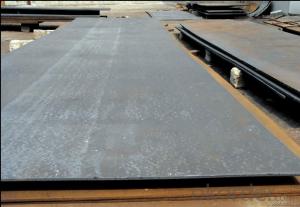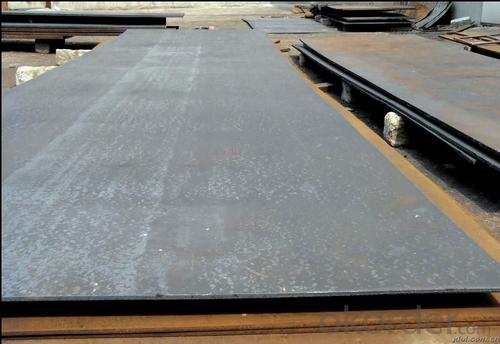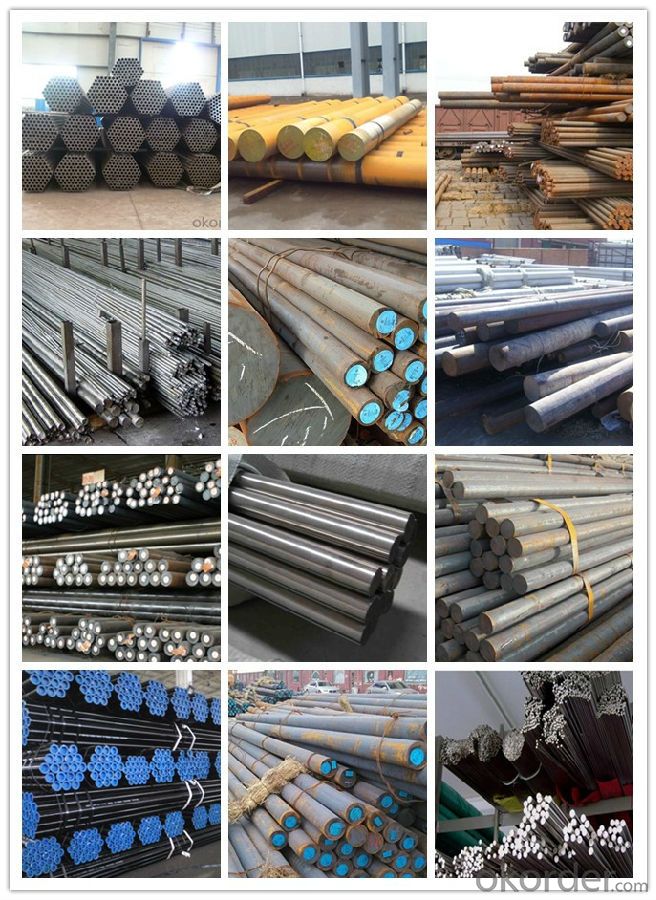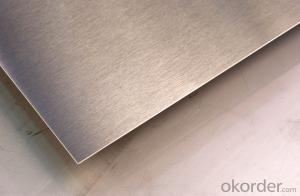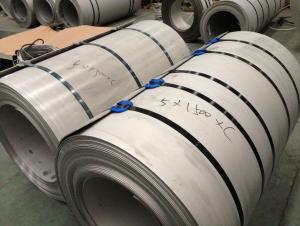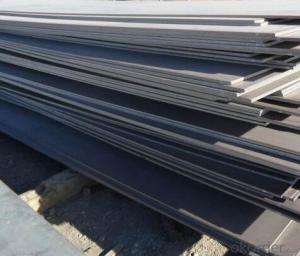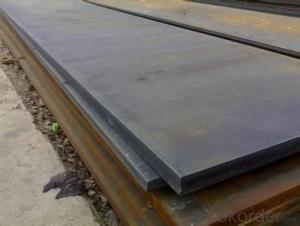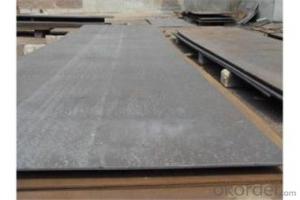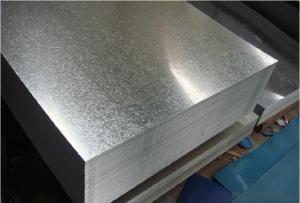Hot Rolled S136/ DIN1.2316 Steel Plates
- Loading Port:
- China main port
- Payment Terms:
- TT OR LC
- Min Order Qty:
- 30 m.t.
- Supply Capability:
- 10000 m.t./month
OKorder Service Pledge
OKorder Financial Service
You Might Also Like
Specification
S136/DIN1.2316 steel plates description:
Chemical composition(%):
C | Si | Mn | Cr | P | S |
0.36-0.45 | ≤0.60 | ≤0.80 | 12.00-14.00 | ≤0.35 | ≤0.03 |
Delivery Condition:
Annealed Hardness: HBS≤ 229
Quenching Hardness: HRC=31-35
Forged + Annealed + Machining (Peeled/Turned)
Available sizes:
Round bar size: 60mm to 350mm
Thickness: 20-300mm
Width: 205-610mm
Length: 2000-5800mm
Application of plastic mould s136 steel plate :
widely use for making of Mirror mould /plate suitable for PVC,PP,A, EP,PC,PMMA plastic mould and The food industry mechanical components
characteristics of plastic s136 steel plate :
1). Excellent corrosion resistance, Belong to medial carbon high chrome Marten site shape stainless steel
2). Good abrasion resistance, High purity, good performance of high mirror polishing, anti-acid, anti-rust after heat- treatment
3). Excellent mechanical processing
4). Hardened with excellent stability
5). Resistance for erosive attack
6). Low deformation rate.
Product show
Workshop show
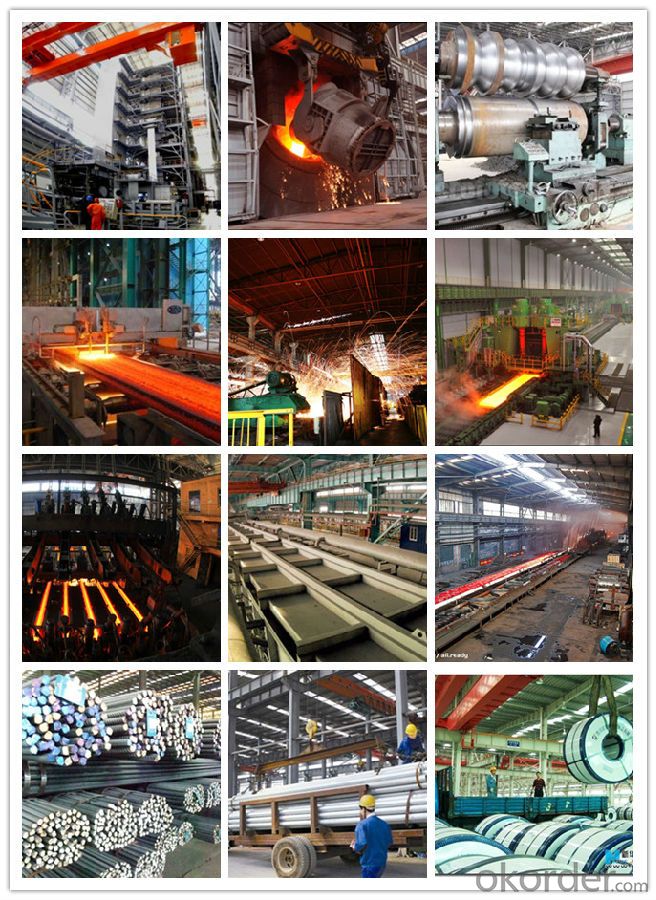
Shipping
1. FedEx/DHL/UPS/TNT for samples, Door-to-Door;
2. By Air or by Sea for batch goods, for FCL; Airport/ Port receiving;
3. Customers specifying freight forwarders or negotiable shipping methods!
Delivery Time: 3-7 days for samples; 5-25 days for batch goods.
Payment Terms
1.Payment: T/T, L/C, Western Union, MoneyGram,PayPal; 30% deposits; 70% balance before delivery.
2.MOQ: 1pcs
3.Warranty : 3 years
4.Package Informations: 1) EXPORT, In 20 feet (GW 25 ton) or 40 feet Container (GW 25 ton)
2)as customer's requirement
Why choose us?
(1) The leading exporter in China special steel industry.
(2) Large stocks for various sizes, fast delivery date.
(3) Good business relationship with China famous factories.
(4) More than 7 years steel exporting experience.
(5) Good after-sales service guarantee.
- Q: What is the purpose of annealing in special steel production?
- The purpose of annealing in special steel production is to improve the mechanical properties and overall quality of the steel. Annealing is a heat treatment process in which the steel is heated to a specific temperature and then slowly cooled, typically in a controlled atmosphere. This process helps to relieve any internal stresses or strains that may have developed during previous manufacturing processes such as rolling or forging. During annealing, the steel's microstructure undergoes changes, resulting in a more refined and homogeneous material. The process allows for the redistribution of atoms, which helps to eliminate defects, improve grain structure, and enhance the steel's toughness, ductility, and machinability. Annealing also helps to reduce the hardness of the steel, making it easier to work with and shape. It can also improve the steel's resistance to cracking and enhance its resistance to corrosion or other environmental factors. Additionally, annealing can help to achieve desired physical properties such as increased hardness or improved magnetic properties in certain special steel alloys. Overall, the purpose of annealing in special steel production is to optimize the steel's properties and ensure it meets the specific requirements of its intended application, whether it be in industries such as automotive, aerospace, or manufacturing.
- Q: How is special steel used in the manufacturing of machinery?
- Special steel, with its unique properties that make it highly suitable for the manufacturing of machinery, is an essential component in this process. It refers to a category of steel alloys that have been specifically designed and developed to possess exceptional strength, durability, and resistance to wear and tear. In various applications within the manufacturing of machinery, special steel is commonly used. One primary use is in producing machine components requiring high strength and toughness, such as gears, shafts, bearings, and fasteners. These components endure heavy loads, high temperatures, and harsh operating conditions, necessitating the ability to withstand these stresses without failure or deformation. Special steel provides the required strength and toughness for ensuring the longevity and reliability of these machine parts. Furthermore, special steel is utilized in manufacturing cutting tools and dies. Cutting tools, including drills, milling cutters, and lathe tools, require excellent hardness and wear resistance to endure the forces and abrasion encountered throughout the machining process. Dies, on the other hand, are used for shaping or forming materials and necessitate high strength and hardness to endure repetitive pressure and deformation. Special steel offers the necessary properties to enhance the performance and lifespan of these cutting tools and dies. Moreover, special steel frequently finds application in constructing machine frames and structural components. Its strength and rigidity make it ideal for supporting heavy loads and maintaining overall machinery stability. By incorporating special steel into machine frame construction, manufacturers can ensure the structural integrity and durability of the machinery, which is crucial for safe and efficient operation. In conclusion, special steel plays a vital role in the manufacturing of machinery by providing the necessary strength, durability, and wear resistance for critical machine components, cutting tools, and structural elements. Its unique properties make it indispensable in producing high-performance machinery capable of enduring the demanding conditions of various industries.
- Q: Can special steel be used for cutting tools?
- Yes, special steel can be used for cutting tools. Special steel alloys, such as high-speed steel (HSS) or tool steel, are specifically designed to have enhanced hardness, toughness, and wear resistance, making them ideal for cutting applications. These steel types can maintain their sharpness and withstand high temperatures and forces, ensuring efficient and durable cutting performance.
- Q: What are the applications of special steel?
- Special steel has a wide range of applications across various industries such as automotive, aerospace, construction, and manufacturing. It is used in the production of high-performance components and structures that require exceptional strength, durability, and resistance to heat, corrosion, and wear. Special steel finds applications in engine parts, aircraft components, cutting tools, molds, and high-rise buildings, among others.
- Q: How does special steel contribute to the automotive engine industry?
- Special steel plays a crucial role in the automotive engine industry by providing superior strength, durability, and performance to various engine components. The unique properties of special steel make it an ideal choice for manufacturing critical parts, such as crankshafts, connecting rods, camshafts, valves, and cylinder liners. One of the key contributions of special steel to the automotive engine industry is its exceptional strength and resistance to high temperatures. Special steel alloys are designed to withstand the intense heat and pressure generated within an engine, ensuring that these components maintain their structural integrity and functionality under extreme conditions. This durability translates into increased engine efficiency, reliability, and longevity. Moreover, special steel's superior mechanical properties, including high tensile and impact strength, allow for the production of lighter yet stronger engine components. By reducing the weight of these parts, special steel helps to enhance fuel efficiency and reduce emissions, making it an environmentally friendly choice for automotive manufacturers. Special steel also contributes to the automotive engine industry by enabling the production of more complex and precise engine components. The excellent machinability and formability of special steel alloys allow for intricate designs, tighter tolerances, and improved performance. This, in turn, contributes to the overall efficiency and power output of the engine. Furthermore, special steel's corrosion resistance properties are crucial in preventing engine components from deteriorating over time. The ability to resist rust and other forms of corrosion ensures that the engine operates at optimal levels for an extended period, reducing maintenance costs and improving overall performance. In summary, special steel's unique properties, including strength, durability, heat resistance, and corrosion resistance, make it an essential material in the automotive engine industry. Its contribution lies in providing superior performance, efficiency, and longevity to critical engine components, ultimately enhancing the overall driving experience for consumers.
- Q: Can special steel be used in the recycling industry?
- Yes, special steel can be used in the recycling industry. Special steel, also known as alloy steel, has specific properties that make it suitable for various applications. In the recycling industry, special steel can be recycled and processed to create new products, reducing the need for raw materials and conserving resources. Its durability, corrosion resistance, and high strength make it valuable in the recycling process, where it can be melted down and transformed into new steel products.
- Q: How is tool steel used in the manufacturing of molds and dies?
- Tool steel is used in the manufacturing of molds and dies due to its exceptional hardness, wear resistance, and toughness. It allows for the creation of precise and durable molds and dies that can withstand the high pressures and temperatures involved in various manufacturing processes. Tool steel also provides excellent dimensional stability, ensuring the accuracy and consistency of the final products.
- Q: What are the main factors affecting the corrosion fatigue strength of special steel?
- The corrosion fatigue strength of special steel is influenced by several factors. Firstly, the composition of the steel plays a crucial role. Special steels typically contain various alloying elements such as chromium, nickel, molybdenum, and copper, which enhance their corrosion resistance. The presence and amount of these elements can significantly affect the corrosion fatigue strength of the steel. Higher levels of alloying elements generally improve the resistance to corrosion fatigue. Secondly, the surface condition of the steel is important. Any surface defects, such as scratches, pits, or roughness, can act as stress concentrators and accelerate the initiation and propagation of corrosion fatigue cracks. Additionally, the presence of surface contaminants, such as dirt, grease, or salts, can increase the corrosive environment and reduce the corrosion fatigue strength of the steel. Thirdly, the environmental conditions in which the steel is exposed play a significant role. Corrosion fatigue occurs due to the combined action of cyclic loading and a corrosive environment. Factors such as temperature, humidity, pH, and the presence of corrosive substances like saltwater or chemicals can accelerate the corrosion process and reduce the fatigue strength of the steel. Furthermore, the mechanical properties of the steel, such as its hardness, strength, and ductility, also influence its corrosion fatigue strength. Higher strength and hardness can enhance the resistance to fatigue crack initiation, while greater ductility can improve the resistance to crack propagation. However, excessive hardness or brittleness can decrease the corrosion fatigue strength. Lastly, the design and manufacturing processes of components made from special steel can impact their corrosion fatigue strength. Factors such as welding techniques, heat treatment, and surface finishing can introduce residual stresses or alter the microstructure of the steel, affecting its corrosion fatigue behavior. Overall, the corrosion fatigue strength of special steel is influenced by its composition, surface condition, environmental conditions, mechanical properties, and manufacturing processes. Understanding and appropriately addressing these factors are crucial for enhancing the corrosion fatigue resistance of special steel components.
- Q: How is special steel used in the medical manufacturing process?
- Special steel is used in the medical manufacturing process for various applications such as surgical instruments, orthopedic implants, and medical devices due to its exceptional properties such as corrosion resistance, biocompatibility, and strength. It is specifically designed and manufactured to meet the stringent requirements of the medical industry, ensuring the safety and effectiveness of healthcare products.
- Q: How does special steel contribute to the manufacturing of valves and pumps?
- Special steel plays a crucial role in the manufacturing of valves and pumps. This type of steel is specifically engineered to possess exceptional strength, durability, and corrosion resistance properties, making it highly suitable for these critical components. Valves and pumps are integral parts of various industrial processes, such as oil and gas, chemical, and power generation industries. They are responsible for controlling the flow of fluids or gases, ensuring efficient and safe operations. Special steel is used in these applications due to its ability to withstand extreme pressure, high temperatures, and aggressive chemicals. One of the primary benefits of special steel in valve and pump manufacturing is its strength. These components often operate under immense pressure, and ordinary steel may not possess the necessary strength to withstand these conditions. Special steel, on the other hand, has enhanced tensile strength, allowing valves and pumps to endure the demand of high-pressure environments without deformation or failure. Corrosion resistance is another crucial aspect of special steel. Valves and pumps often come into contact with corrosive substances, such as saltwater, acids, or chemicals. Special steel is engineered to resist corrosion, preventing the degradation of these components and ensuring their longevity. By using special steel, manufacturers can create valves and pumps that can withstand harsh environments and corrosive substances, reducing maintenance costs and downtime. Furthermore, special steel offers excellent durability, which is vital for valves and pumps that need to operate continuously for extended periods. These components are subjected to constant wear and tear due to fluid flow and pressure fluctuations. Special steel's resistance to fatigue and wear ensures that valves and pumps can function reliably and efficiently over time, minimizing the risk of breakdowns and extending the lifespan of the equipment. In conclusion, special steel is indispensable in the manufacturing of valves and pumps. Its exceptional strength, corrosion resistance, and durability properties make it an ideal material for these critical components. By utilizing special steel, manufacturers can produce valves and pumps that can withstand extreme conditions, resist corrosion, and operate reliably, contributing to safer and more efficient industrial processes.
Send your message to us
Hot Rolled S136/ DIN1.2316 Steel Plates
- Loading Port:
- China main port
- Payment Terms:
- TT OR LC
- Min Order Qty:
- 30 m.t.
- Supply Capability:
- 10000 m.t./month
OKorder Service Pledge
OKorder Financial Service
Similar products
Hot products
Hot Searches
Related keywords
